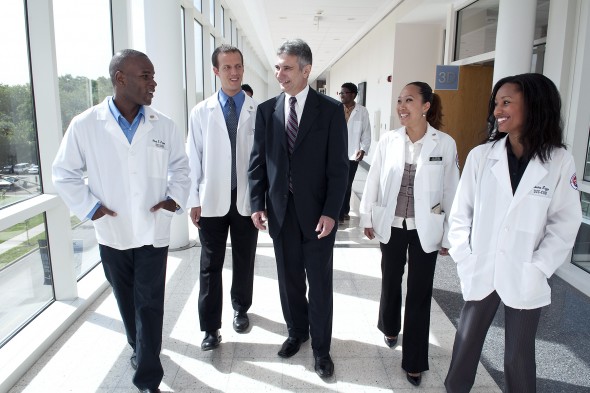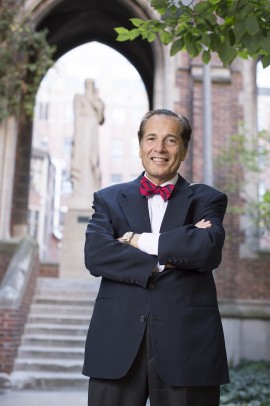College of Medicine plan integrates engineering, technology

The College of Medicine presented the university Board of Trustees a proposal to integrate engineering and technology into medical training programs.
The College of Medicine presented the university Board of Trustees a white paper with recommendations that would integrate engineering and technology into medical training programs, develop a new bioengineering institute and build upon research to attract more federal funding to the four regional campuses at Chicago, Peoria, Rockford and Urbana-Champaign.
The initiative would draw upon the campuses’ strengths in engineering and medicine. The College of Medicine, the nation’s largest and most diverse, is part of a comprehensive health sciences center. The Urbana-Champaign campus has one of the nation’s top-ranked colleges of engineering and well-known strengths in supercomputing, basic and applied sciences, and humanities.
“The University of Illinois is well-positioned to leverage and integrate existing engineering and medical expertise to provide our students new opportunities for learning and research in bioengineering and biotechnology,” said Dimitri Azar, dean of the College of Medicine.
“A unified college of medicine, together with UIC’s six other health science colleges, has the potential to promote university-wide collaborations that take advantage of our existing strengths.”
Some recommendations could be achieved relatively quickly and at modest cost, Azar said, including:
- expanded opportunities for students at all campuses by incorporating engineering into medical training
- a new medical engineering training track
- expanded engineering-based M.D./Ph.D. program and residency programs
- formalized partnerships with regional health systems for greater clinical training opportunities at College of Medicine sites in Peoria and Urbana-Champaign.
The proposal to establish a multi-campus Illinois Translational BioEngineering Institute within the College of Medicine would require additional resources, Azar said.
“The recommendations are designed to be accomplished within the current unified College of Medicine structure in a step-wise fashion, leading up to the development of the institute,” Azar said.
The College of Medicine recommendations come several months after the Urbana-Champaign campus proposed a new, privately-funded college of medicine that would include a partnership between the new college, the Urbana-Champaign engineering college and Carle Health System, a private, 325-bed regional medical center in Urbana. The proposed college would enroll 25 students in its first year, leading up to a class size of 50 within a few years. The new college is estimated to require $400 million in start-up costs.
“The recommendations we are putting forward have the added benefit of saving substantial amounts of the projected start-up costs for a new medical school, and avoid the delay of seeking a new accreditation,” Azar said.

“There is significant potential for new opportunities,” says College of Medicine dean Dimitri Azar. Photo: Chris Strong
UIC has already made strides to integrate medicine and engineering. Supported by the Richard and Loan Hill Endowment, the department of bioengineering last year was restructured to be housed jointly in the College of Engineering and the College of Medicine.
“There is significant potential for new opportunities by linking, coordinating and enhancing these activities between the UI College of Medicine, which ranks in the top third of U.S. medical schools for National Institutes of Health funding, and the College of Engineering at Urbana-Champaign, which is home to the National Center for Supercomputing Applications and strong computer science and genomics programs,” Azar said.
The final step in the College of Medicine proposal to trustees – an Illinois Translational BioEngineering Institute in collaboration with the College of Engineering at Urbana-Champaign — would promote translational research and spur economic development, Azar said.
“One of the greatest strengths of the University of Illinois College of Medicine is that it has a truly state-wide impact and is a leader in both rural and urban medicine,” Azar said.
“Right now, we have the opportunity to build upon our broad influence on research, patient care and biomedical innovation by reorganizing and enhancing our educational programs. We can dramatically expand engineering-based medical training that will let our students become leaders as physicians, scientists, and inventors of the technologies that will be the standard tools for the practice of medicine in the 21st century.”
